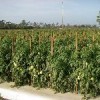Abstract
Even though drip irrigation is more efficient than the other irrigation methods, proper system management is crucial if that increased efficiency is going to result in water savings and a viable crop. One important aspect of drip irrigation management for crop success is irrigation scheduling, which includes determining both how much and when to irrigate. The grower can use several different methods to help develop a suitable irrigation schedule. Proper scheduling needs to be implemented to take full advantage of the increased drip irrigation efficiency. Two examples are presented in this 5-page fact sheet for tomatoes and peppers, which are two important vegetable crops in Florida, to demonstrate the use of reference evapotranspiration and crop coefficients in developing a drip irrigation schedule. Written by Sanjay Shukla, James M. Knowles, and Niroj K. Shrestha, and published by the UF Department of Agricultural and Biological Engineering, April 2014.
References
Clark et al. 1993. Water Requirements and Crop Coefficients for Tomato Production in Southwest Florida. Southwest Florida Water Management District, Brandon, FL.
FDEP, 2011. Regional Water Supply Planning, Annual Report. Florida Department of Environmental Protection (FDEP). http://www.dep.state.fl.us/water/waterpolicy/rwsp.html
Shukla, S., F. H. Jaber, D. Goswami and S. Srivastava 2012. "Evapotranspiration Losses for Pepper Under Plastic Mulch and Shallow Water Table Conditions." Irrigation Science. DOI 10.1007/s00271-012-0327-3 https://doi.org/10.1007/s00271-012-0327-3

